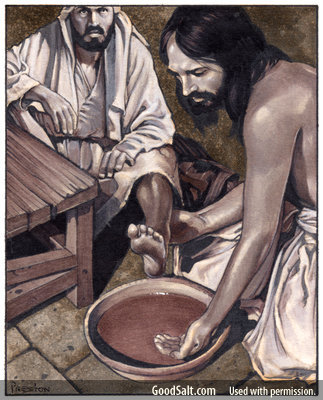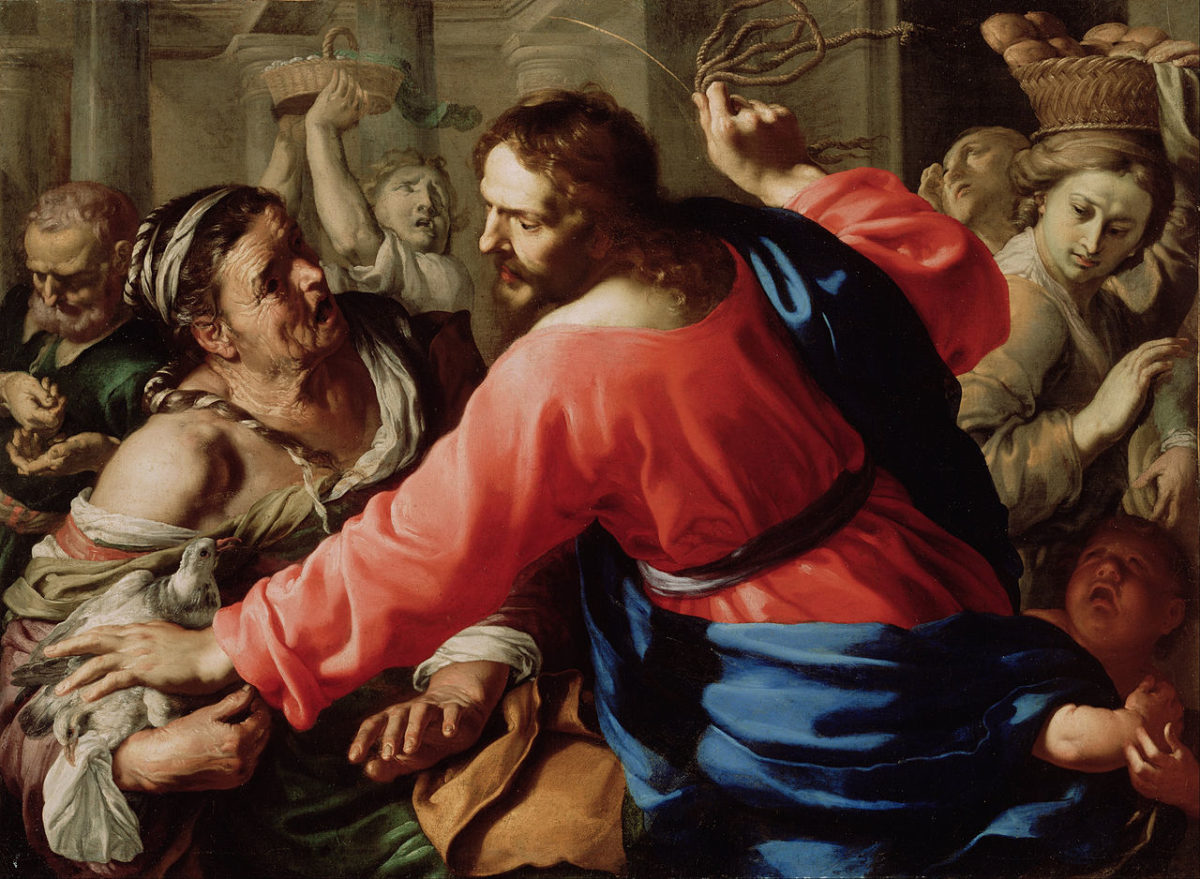“Jesus said to him, ‘He who is bathed needs only to wash his feet, but is completely clean; and you are clean, but not all of you.’ ” John 13:10
We are learning in John 13 how we can experience the blessedness of clean feet or intimacy with Christ. So far we have discovered that we must…
– Recognize Jesus’ loyal love for us (John 13:1-2).
– Reckon who we are in Christ (John 13:3-5).
Today we discover we can experience the blessedness of clean feet when we RECEIVE JESUS’ CLEANSING GRACE (John 13:6-11). In Jesus’ day, people wore sandals without any socks or stockings on their feet. Since the roads were dusty, their feet would become dirty and need to be washed. It was the host’s responsibility to provide a servant to wash the guest’s feet. But Jesus did something that was unheard of in that day. He, a Rabbi, got up from the table and took the position of a servant and began washing His disciples’ feet.
John informs us, “Then He came to Simon Peter. And Peter said to Him, ‘Lord, are You washing my feet?’ ” (John 13:6). Apparently there was nothing said as Jesus washed the other disciples’ feet until He came to Peter. Peter did not understand the significance of what Jesus was doing. “Jesus answered and said to him, ‘What I am doing you do not understand now, but you will know after this.’ ” (John 13:7). Jesus asks Peter to submit to Him by permitting Him to wash his feet. He assures Peter that he will understand the significance of this foot washing later.
Has Christ ever asked you to do something that does not make any sense to you? But later on, the Lord showed you what He was doing in your life or in the lives of others? Maybe He is asking you to do something that no one else will do. When Christ tells us to do something, we must be willing to do it whether it seems reasonable to us or not. This is one of the keys to experiencing the blessedness of intimacy with Jesus!
“Peter said to Him, ‘You shall never wash my feet!’ ” (John 13:8a). Peter may be saying, “You shall never wash my feet for eternity!” Peter felt that Jesus should not degrade Himself by performing such a lowly task. Or perhaps he was thinking, “Never, Lord. My feet are not dirty, and even if they were, I certainly cannot permit You to clean them.” Peter’s words reflect pride and false humility. Our humility does not begin with giving service to others. It begins with a readiness to receive it. It is easier to have pride and a condescending attitude when we receive service rather than when we give it. For example, we may not hesitate to take a meal to a church member who has taken ill. But it is more difficult for us to receive such a meal if we are the one who is sick.
“Jesus answered him, ‘If I do not wash you, you have no part with Me.’ ” (John 13:8b). Jesus is not talking about social fellowship here as Peter was thinking, rather He is talking about spiritual fellowship (closeness) as the context will reveal (cf. 13:10-11). “If I don’t cleanse you from the effects of sin (dirt on your feet), you can have no part (fellowship) with Me,” Jesus is saying. The word “part” (meros) is a term for fellowship (cf. Luke 10:42) in the New Testament.1 Hodges states, “This truth, of course, is more fully elaborated in I John 1:5-10 where fellowship is related to the question of the believer’s ‘walk’ (which one’s ‘feet’ suggest) and it is conditioned on the cleansing that comes in response to confession of sin (I John 1:9).” 2 Peter could not have fellowship with the Lord until He was willing to receive His cleansing ministry.
The same is true for all believers in Jesus. We cannot enjoy fellowship or closeness with our Lord until we are willing to let Him cleanse our dirty feet (the effects of sin in our lives). We must be honest with the Lord about sin, which John refers to as “walking in the light” (I John 1:7), and “confess” that sin to Him and God promises to be faithful to forgive us of that confessed sin 3 and cleanse us of all unrighteousness or unknown sin in our lives (I John 1:9).
“Simon Peter said to Him, ‘Lord, not my feet only, but also my hands and my head!’” (John 13:9). Peter’s outburst reveals his deep need for intimate fellowship with the Lord Jesus. “If fellowship with You, Lord, depends on cleansing, then wash not only my feet but my hands and head, too!” Peter seems to be telling the Lord what to do instead of submitting fully to Him.
“Jesus said to him, ‘He who is bathed needs only to wash his feet, but is completely clean.’” (John 13:10a). In the first century, there were no bathing facilities in small houses. So a person had to go to a public bathhouse to bathe. When invited to a meal, a person would first go to the public bathhouse and bathe, and then put on clean clothing, anoint himself with fresh oil, and proceed to the home where he would be served a meal. On the way from the bathhouse to the home, the guest’s feet got dirty. Hence, the host provided a basin of water so that the one who already had a bath and cleansed his entire body could sponge the dirt off his feet. 4
Jesus is referring to two types of cleansing in this verse. The first type of cleansing refers to the complete cleansing of regeneration or salvation which takes place at the moment of faith in Jesus (cf. Titus 3:4-5; Revelation 1:5). This is seen in the word “bathed” (louō) which refers to bathing the entire body. 5 This verb is in the perfect tense which conveys the idea of a permanent cleansing. A person only needs one complete bath spiritually. This is a one-time experience. The Holy Spirit performs this complete cleansing at the moment of faith in Jesus for eternal life (Titus 3:4-5). Some believers think they need to be totally bathed over and over again. They fail to understand that God’s water or soap is guaranteed for eternity.
Have you experienced this one-time permanent cleansing? If not, Christ invites you right now to believe or trust in Him alone for it. Jesus said, “He who believes in Me has everlasting life.” (John 6:47). Once you trust in Christ, you will need the second type of cleansing that He speaks of next.
This second type of cleansing refers to daily forgiveness in order to have fellowship or closeness with God. This cleansing is represented by the word “wash” (niptō) which means to wash parts of the body. 6 This fellowship forgiveness (cf. Matthew 6:14-15; Luke 11:4) is based upon the confession of sin (I John 1:9). So Christ is saying in verse 10, “He who is bathed [regeneration] needs only to wash his feet [fellowship], but is completely clean.” Every bathed person (Christian) needs daily cleansing of his dirty feet to have fellowship with Christ.
For example, “just as our children may sin within our family, the believer may sin within God’s family. Our child is always our child, but until he confesses [his sin], our fellowship is not good. In God’s family, the same principle applies. There is a forgiveness for salvation and a forgiveness for restoration. The Lord referred to this second kind of forgiveness when He said to Peter, ‘If I do not wash you, you have no part with Me’ (Jn. 13:8). Peter told the Lord to wash him all over if that was the case. To this Jesus replied, ‘He who has bathed needs only to wash his feet, but is completely clean’ ” (Jn. 13:10).” 7
“Jesus said to him, ‘… and you are clean, but not all of you.’ ” (John 13:10b). All but one of the disciples were “completely clean” in their position before God and could have fellowship with the Lord. “For He knew who would betray Him; therefore He said, ‘You are not all clean.’ ” (John 13:11). Judas had not experienced the cleansing bath of salvation because of his refusal to believe in Christ (cf. John 6:64, 70-71; 17:12). Nothing in the text suggests that Jesus did not wash Judas’ feet. Christ cleansed the feet of His greatest betrayer. This teaches us not to be selective about whom we will love. Christ loved everyone, including His enemies. And He commands us to do the same (cf. Matthew 5:43-48).
As I have thought about Jesus washing the feet of His disciples, including the feet of Judas, I realized that Jesus did not ask them why they walked through the mud and got dirty. That is a part of life. Water was there regardless of the amount of dirt on their feet. The Lord does not seek to condemn us. He seeks to cleanse us (cf. John 3:17; I John 1:5-10). All Christians have a need for daily cleansing because we all sin (Romans 3:23). We all have dirty feet. As we appreciate God’s cleansing grace in our lives both at the moment of salvation and daily for fellowship, we will grow deeper in our intimacy with Jesus and be more eager to humbly serve Him by serving others.
Prayer: Gracious Lord Jesus, thank You for the complete cleansing bath You gave me the moment I believed in You alone for Your gift of everlasting life (Titus 3:4-5)! Thank You that I do not need to repeat that bath because it permanently cleansed me of all my sin and shame positionally. But my feet still get dirty – I still sin as I walk with You in this sin-stained world – and I need cleansing from You daily. I praise You because You are faithful to forgive the sin I confess to You (I John 1:9)! And not only that, You graciously cleanse me of all my unknown sin at that time as well! I am doubly blessed by Your faithfulness to me! Please use me, my Lord and my God, to serve You by serving others even when it may not make sense to me or be the popular thing to do. Serving You in light of all You have done for me is one of the greatest privileges I could ever do. In Your grace-filled name I pray. Amen.
ENDNOTES:
1. Zane C. Hodges, “Untrustworthy Believers – John 2:23-25,” Bibliotheca Sacra 135:538 (April-June 1978), pg. 147; Joseph C. Dillow, The Reign of the Servant Kings: A Study of Eternal Security and the Final Significance of Man, (Hayesville: Schoettle Publishing Co., 1992), pp. 326, 353, 401,593-594; Robert N. Wilkin, “The Gospel According to John,” The Grace New Testament Commentary, Vol. 1: Matthew – Acts (Denton, TX: Grace Evangelical Society, 2010), pg. 438.
2. Hodges, “Untrustworthy Believers,” pg. 147.
3. Literally “the sins,” tas hamartias.
4. J. Dwight Pentecost, The Words & Works of Jesus Christ, (Grand Rapids: Zondervan, 1981), pg. 429.
5. A Greek-English Lexicon of the New Testament and Other Early Christian Literature [BAGD], compiled by Walter Bauer, trans. and adapted by William F. Arndt and F. Wilbur Gingrich, 2nd ed., rev. and augmented by F. Wilbur Gingrich and Frederick W. Danker (Chicago: University of Chicago Press, 1979), pp 480-481.
6. Archibald Thomas Roberston, Word Pictures in the New Testament, Vol. V. (Grand Rapids: Baker Book House, 1932), pp. 238-239.
7. Dillow, The Reign of the Servant Kings, pg. 353.


